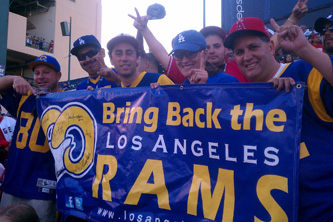It has finally happened. After more than twenty years, NFL football is returning to the City of Angels, Los Angeles.
On January 12th, NFL owners met in Houston and, after a second-round of voting, allowed for the St. Louis Rams to return to the City of Angels for the 2016 season with an option for the San Diego Chargers to join them in the next year. NFL Commissioner Roger Goodell said in a press conference after the vote came through that the decision was “bittersweet” for the league as “relocation is a painful process for the league is general. Stability is something we’ve taken a great deal of pride in.” Even with that feeling, Goodell finished by saying that “the Rams are returning home to Los Angeles.” However, more uncertainty surrounds the move than excitement.
Like any other NFL market, Los Angeles will expect a winner. The Rams have failed to post a winning record since the 2003 season, and while they are still a young team, if they fail to win soon it could drive fans away from the team early.
With a team that has failed to produce on the field, another question that comes up is the attendance of Rams games. It is easy to see the first three of the Los Angeles Rams having good ticket sales due to the excitement in the LA area, but what happens if they fail to make the playoffs those first three years? Low attendance was one of the main reasons the Rams left in the first place with their last game in LA having worse attendance than some high school games.
A final question is the LA market itself. There are so many options for LA sports fans, from two NBA teams, two MLB teams, an NHL team, and USC and UCLA football that, except for the Lakers, have been highly successful in recent years. Along with the weather and beaches, there is a lot going on in LA that it could become easy for fans to forget about the Rams.
Maybe the biggest question of this whole scenario is, in a league that is driven by ticket revenue and merchandise sales from fans, why do the fans always seem to lose out? This seems to be the only question that has an answer to it and that is the demand for the NFL and its owners to make more money.



